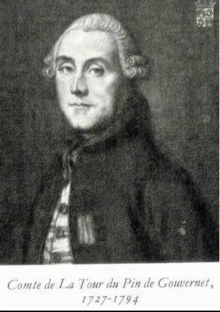Jean-Frédéric de La Tour du Pin Gouvernet
Jean-Frédéric, marquis de La Tour du Pin, comte de Gouvernet (born March 22, 1727 in Grenoble , † April 28, 1794 ) was a French officer and 1790-1791 Minister of War .
Life
family
He was the son of Jean de La Tour du Pin Gouvernet, baron de Cubzac, called le comte de Paulin and his mother Suzanne de La Tour. He himself married Marie-Thérèse Billet in his first marriage in 1753 and in 1755 his second marriage to Cécile-Charlotte-Marguerite Guynot [or Guinot] de Mauconseil. The daughter Cécile-Suzanne and the son Frédéric-Séraphin emerged from the second marriage .
Military career
Tour de Pin had been a career officer in the royal army since 1741. He was later the commander of various regiments. He distinguished himself especially in the Seven Years' War . He was last in the position of lieutenant-général . His marriage made the province of Saintonge the center of his life. Louis XVI appointed him military commander among other things of this and neighboring areas.
The nobility of Saintes elected him to the Estates General in 1789 . He was one of the first nobles to join the Third Estate . Tour du Pin kept an open house in Versailles . MPs of all stripes met there every two weeks for a dinner. Maximilien Robespierre was one of the guests .
Louis XVI appointed him Minister of War in August 1789. As such, he has initiated several major reforms. One of the areas of symbolic politics was that he introduced the tricolor to the military. In particular, he made efforts to restore military discipline.
After he had a mutiny in Nancy ( Nancy affair ) put down in 1790 and imposed severe sentences, there were protests of the sans-culottes in the streets of Paris. In the Constituent Assembly , among others, Georges Danton turned against him.
Tour du Pin resigned in November 1790 and went into exile in England. When Louis XVI. When the trial was done, he returned to France to argue for his idea of a constitutional monarchy . After realizing that his endeavor was unsuccessful, he retired to Auteuil . There he was arrested on August 31, 1793.
He was brought out of prison to witness the trial of Marie Antoinette . He defended this with commitment. He refused to designate her as a widow Capet, as the Prosecutor Antoine Quentin Fouquier-Tinville had requested. As a result, he lived almost seven months in prison before he was sentenced and executed with his brother on April 28, 1794.
Individual evidence
literature
- Richard Ballard: A New Dictionary of the French Revolution. New York, 2012 Partially digitized
- Steven T. Ross: The A to Z of the Wars of the French Revolution. Lanham, 1998 pp. 89f.
| personal data | |
|---|---|
| SURNAME | La Tour du Pin Gouvernet, Jean-Frédéric de |
| ALTERNATIVE NAMES | Jean-Frédéric, marquis de La Tour du Pin, comte de Gouvernet |
| BRIEF DESCRIPTION | French officer and minister of war |
| DATE OF BIRTH | March 22, 1727 |
| PLACE OF BIRTH | Grenoble |
| DATE OF DEATH | April 28, 1794 |
| Place of death | Paris |
